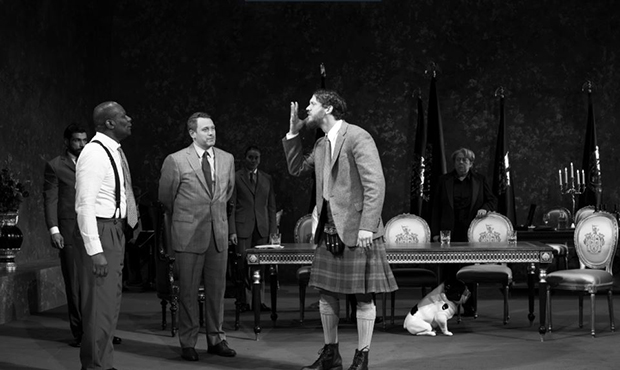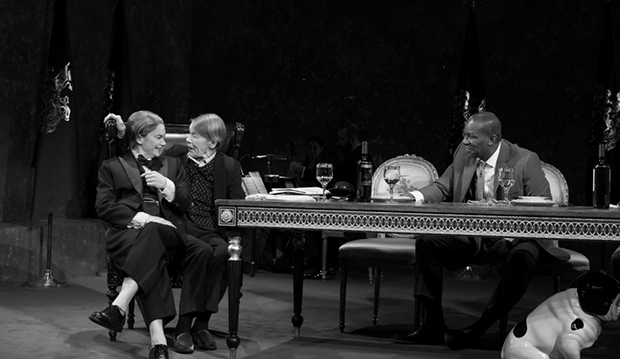Glenda Jackson and Shakespeare Vs. Sam Gold in Erratic New King Lear
One of the world’s greatest actors and a Tony-winning director vie for our attention for three-and-a-half hours.

(© Brigitte Lacombe)
A reminder about Shakespeare's King Lear, now running at the Cort Theatre: It's long. Coffee up, use the bathroom, and get comfortable, because intermission is two hours away in Sam Gold's erratic new production of Shakespeare's great play. Eighty-two-year-old Glenda Jackson in the title role is the main attraction here, and her ferocious energy unbelievably never sags once during the show's three-and-a-half hours. Too bad that her frisky, wholly original performance seems to be going head-to-head with a director intent on imposing conceptual devices at every turn.
While a lot of his choices are distracting (we'll get to them), to Gold's credit most of the storytelling in this King Lear is surprisingly digestible for audiences who may not be well versed in the Bard's works. Lear, the elderly king of England, divides his kingdom among his daughters and their spouses based on how much they say they love him. Goneril (Elizabeth Marvel) and her husband, the Duke of Albany (Dion Johnstone), and Regan (Aisling O'Sullivan) and her spouse, the Duke of Cornwall (Russell Harvard), each receive a third after offering Lear flowery declarations of their affections. Youngest daughter Cordelia (Ruth Wilson), however, refuses to ingratiate herself with her father, so he disinherits her. As Goneril, Regan, and their husbands plot to strip their father of what little power he has left, Edmund (Pedro Pascal), the bastard son of the Earl of Gloucester (Jayne Houdyshell), plans to seize power himself by pitting the sisters against each other, using his legitimate brother, Edgar (Sean Carvajal), as a prop.
While not as experimental as his plodding Public Theater Hamlet in 2017, the real focus of Gold's Lear gets mired as multiple concepts vie for the spotlight. There's the gender-blind casting of three central roles (provocative), a Cordelia who may or may not be disguising herself as Lear's Fool (muddy), a wide assortment of accents (perplexing), a Trump parallel in Miriam Buether's gold-plated set that is otherwise ignored (unsubtle), and a live string quartet that plays original music by Philip Glass even as the proverbial ship sinks (distracting).
Similarly, the performances vary wildly. There are obvious standouts: John Douglas Thompson is a perfect Kent in every sense, and Houdyshell is a sympathetic Gloucester. Others range from underwhelming (Pascal, who bores as Edmund) or obnoxious (Marvel plays Goneril like a shrill Real Housewife) to incomprehensible (Carvajal speaks way too quickly, while Irish actor O'Sullivan speaks too slowly in order to maintain an unspecific dialect that frequently lapses). Wilson impresses with her rubber-limbed, Chaplin-esque Fool, but are the Fool and Cordelia the same person in this production? Or is Wilson simply doubling? Gold's staging is unclear, especially toward the end.

(© Brigitte Lacombe)
One concept that does work — brilliantly — is the casting of Harvard, a deaf actor, as Cornwall. Watching the burly Harvard sign his way through the text is particularly exhilarating, and I was equally captivated by the expressiveness of his interpreter, fellow cast member Michael Arden, as he translates whole swaths of Shakespeare into American Sign Language for the deaf Cornwall. That these elements are included without special attention being drawn to them is major, especially on Broadway. It goes a huge way in terms of inclusivity.
It should be noted that Gold doesn't turn this into Queen Lear; in fact, his staging admirably also draws no attention to Jackson's gender at all. In Ann Roth's chic suits, Jackson is every inch a king, and he's not going down without a fight. It's an impressive show of stamina on Jackson's part, and her level of technique is wholly unparalleled in terms of diction, lucidity, and clarity of speech. In that regard, I've never seen a Shakespearean performance that comes close to achieving what she miraculously creates onstage.
However, if you're accustomed to a Lear who falls into a gradual physical decline before our eyes, you're not going to get that. Jackson's Lear kicks and screams until his final breath, with all the technical precision of an actor who's spent a lifetime waiting for this part (she first played Lear in a different production at the Old Vic in 2016). Though this powerful characterization doesn't lead to a particularly heart-wrenching ending, you walk out feeling like you've seen a performance that people will be talking about for ages. Jackson didn't need to run a victory lap after winning the Tony and numerous other awards for Three Tall Women last season, but once again, she has proved herself the king of Broadway.

(© Brigitte Lacombe)







